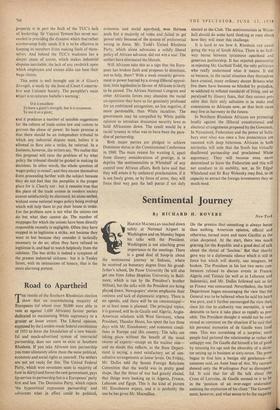Road to Apartheid
THE results of the Southern Rhodesian election show that an overwhelming majority of Europeans (of whom over 50,000 were able to vote as against 1,600 Africans) favour parties dedicated to maintaining White supremacy to a greater or lesser extent. The Liberal opinion, supposed by the London-made federal constitution of 1953 to form the foundation of a new beauti- ful and much-advertised system of interracial partnership, does not seem to exist in Southern Rhodesia. If you take Africans into partnership you must ultimately allow them the same political, economic and social rights as yourself. The settlers are not yet ready for this. The United Federal Party, which won seventeen seats (a majority of four in thirty) and forms the new government, pays lip-service to partnership but is a Europeans' party first and last. The Dominion Party, which rejects `the hypocritical expression partnership' and advocates what in effect could be political, economic and social apartheid, won thirteen seats but a majority of votes and failed to get power only because of the system of preferential voting in force. Mr. Todd's United Rhodesia Party, which alone advocates a mildly liberal policy of African advance, did not win a seat. The settlers have eliminated the liberals.
Will Africans take this as a sign that the Euro- pean has broken faith and proposes to dominate, not to help, them? With a weak minority govern- ment in power harried by a strong illiberal opposi- tion, little legislation in favour of Africans is likely to be passed. The African National Congress and other Africanist forces may abandon the racial co-operation they have so far genuinely professed for an embittered antagonism, no less negative, if more pardonable, than White racialism. The government may be compelled by White public opinion to introduce draconian security laws to hold Africanism down. The result would be a racial tyranny in what was to have been the para- dise of partnership.
Both major parties are pledged to achieve Dominion status at the Constitutional Conference in 1960. The main reason for wanting it, apart from illusory considerations of prestige, is to deprive 'the sentimentalists in Whitehall' of any control over African affairs. Both have said that they will attain it by unilateral proclamation, if it is not freely given, or by force of arms; they will force their way past the hall porter if not duly elected to the Club. The sentimentalists in White- hall should do some hard thinking at once about how they will meet this challenge.
It is hard to see how S. Rhodesia can avoid going the way of South Africa. There is no half- way house between tyrannous apartheid and generous partnership. It has rejected partnership in rejecting Mr. Garfield Todd, the only politician who really understood what it means. It did so because, in the racial situation they themselves have created, many ordinary decent Britons who live there have become so blinded by prejudice, so addicted to inflated standards of living, and so paralysed by illusory fears, that they cannot per- ceive that their only salvation is to make real concessions to Africans now, so that both races may live in harmony in the future.
In Northern Rhodesia Africans are protesting loudly against the illiberal constitutional and electoral arrangements proposed by the Governor In Nyasaland, Federation and the power of Salis bury over what was once a free protectorate are resented with deep bitterness. .Africans in both territories will note that the South has virtually disallowed partnership and proclaimed White supremacy. They will become even more determined to leave the Federation and this will not conduce to its stability, nor, as Sir Edgar Whitehead and Sir Roy Welensky may find, to its capacity to attract the foreign investments they so much need.


































 Previous page
Previous page